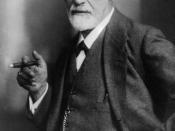Richard III: Why is Richard III so profoundly evil?
In the speech that begins Richard III, the title character gives us an explicit answer to this question: he is evil by his very nature. A misshapen hunchback whose image is unpleasing to the eye, Richard recognizes that he cannot be a lover and so he is "determined to prove a villain" (I, i., l.30).
Macbeth is ambitious, and like the protagonist of the Scottish tragedy, Richard seeks (and gains) the throne. But unlike Macbeth, there is no redeeming quality in Richard III, no "lady" with whom he shares a tender moment or even a Banquo to betray. Awakening from the visitation of the ghosts of those who he has murdered, Richard comes to grips with his utter
evil, saying to himself, "Alas, I rather hate myself/For hateful deeds committed by myself/I am a villain; yet I lie, I am not" (V, iii, ll.189?191).
Evil and deceit are innate in Richard III.
"Things at the worst will cease." Macbeth, Act IV. sc. 2.
Shakespeare Quotes: Tomorrow, and tomorrow, and...
"To?morrow, and to?morrow, and to?morrow,
Creeps in this petty pace from day to day,
To the last syllable of recorded time;
And all our yesterdays have lighted fools
The way to dusty death. Out, out, brief candle!
Life's but a walking shadow; a poor player,
That struts and frets his hour upon the stage,
And then is heard no more: it is a tale
Told by an idiot, full of sound and fury,
Signifying nothing." ??From Macbeth (V, v, 19)
Macbeth is on the castle walls, under siege by his enemies. A cry is heard from within the castle, and Macbeth learns that his wife has killed herself. There was a time when such a message would have chilled his heart,


